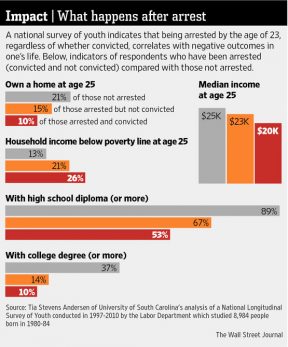30 Percent of Americans Have Criminal Records
Over the past 20 years, authorities have made more than a quarter of a billion arrests, the Federal Bureau of Investigation estimates. As a result, the FBI currently has 77.7 million individuals on file in its master criminal database—or nearly one out of every three American adults.
Between 10,000 and 12,000 new names are added each day.
 Spending on law-enforcement by states and local governments hit $212 billion in 2011, including judicial, police and corrections costs, according to the most recent estimates provided to the U.S. Census Bureau. By comparison, those figures, when adjusted for inflation, were equivalent to $179 billion in 2001 and $128 billion in 1992.
Spending on law-enforcement by states and local governments hit $212 billion in 2011, including judicial, police and corrections costs, according to the most recent estimates provided to the U.S. Census Bureau. By comparison, those figures, when adjusted for inflation, were equivalent to $179 billion in 2001 and $128 billion in 1992.
In 2011, the most recent year for which figures are available, the Bureau of Justice Statistics put the number of full-time equivalent sworn state and local police officers at 646,213—up from 531,706 in 1991.
At the University of South Carolina, researchers have been examining other national data in an attempt to understand the long-term impact of arrests on young people. Using information from a 16-year-long U.S. Bureau of Labor Statistics survey, researchers tracked 7,335 randomly selected people into their 20s, scrutinizing subjects for any brushes with the law.
Researchers report that more than 40% of the male subjects have been arrested at least once by the age of 23. The rate was highest for blacks, at 49%, 44% for Hispanics and 38% for whites. Researchers found that nearly one in five women had been arrested at least once by the age of 23.
They further determined that 47% of those arrested weren’t convicted. In more than a quarter of cases, subjects weren’t even formally charged.
For example, more than 95% of subjects without arrests in the survey graduated high school or earned an equivalent diploma. The number falls to 84.4% for those who were arrested and yet not convicted.
According to a 2012 survey by the Society for Human Resource Management, 69% of employers conduct criminal background checks on all job applicants. Fewer than that—about 58%—allow candidates to explain any negative results of a check.






